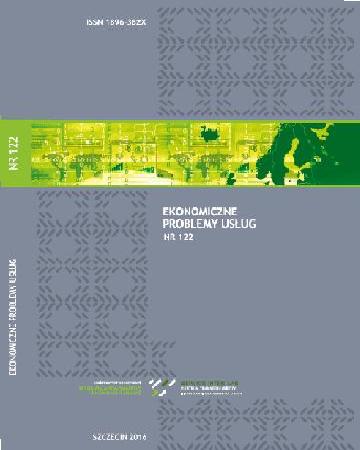
ISSN: 1896-382X
eISSN: 2353-2866
OAI
DOI: 10.18276/epu.2016.124-07



Issue archive /
nr 124 2016
Development stages of comprehensive service for perishable cargo at seaports
| Authors: |
Ludmiła
Filina-Dawidowicz
West Pomeranian University of Technology Faculty of Maritime Technology and Transport |
| Keywords: | comprehensive service perishable cargo seaport service development stages |
| Data publikacji całości: | 2016 |
| Page range: | 11 (87-97) |
Abstract
Increasing interest in perishable cargo transport and logistic services is connected with international trade growth, as well as technology and markets development. Shippers, carriers, forwarders, and logistic operators pay more attention to the quality and complexity of delivered food services within a supply chain. In particular, it refers to seaports functioning where perishable cargo is handled and different logistic services are delivered. The aim of the study is to focus on and explore the concept of comprehensive service development in seaports related to perishable cargo, and to determine the stages for developing this service in container terminals and ports refrigerated warehouses. This study is the preliminary step for a comprehensive service for perishable cargo development in seaports for the current literature. The levels of the comprehensive service development were determined. As a result, an algorithm for the implementation of a comprehensive logistics service for perishable goods in seaport was proposed.
Download file
Article file
Bibliography
| 1. | Alam, I., Perry, C. (2002). A customer-oriented new service development process. Journal of Services Marketing, 16 (6), 515‒534. |
| 2. | Arduino, G., Murillo, D.C., Parola, F. (2015). Refrigerated container versus bulk: evidence from the banana cold chain. Maritime Policy & Management, 42 (3), 228‒245. |
| 3. | Filina-Dawidowicz, L., Gajewska, T. (2016). Customer satisfaction in the field of comprehensive service of refrigerated containers in seaports (pp. 141‒146). The 5th IEEE International Conference on Advanced Logistics and Transport (ICALT). |
| 4. | Filina-Dawidowicz, L., Postan, M.Ya. (2015). The directions of services development of European seaports specializing in handling perishable goods. Zeszyty Naukowe Uniwersytetu Szczecińskiego, 884, Ekonomiczne Problemy Usług, 119, 85‒98. |
| 5. | Grzelakowski, A.S., Matczak, M. (2006). Ekonomika i zarządzanie przedsiębiorstwem portowym. Podstawowe zagadnienia. Gdynia: Wydawnictwo Akademii Morskiej w Gdyni. |
| 6. | Klimek, H., Dąbrowski, J. (2013). Funkcja logistyczna portów morskich. Logistyka, 4, 57‒58. |
| 7. | Kotowska, I. (2015). Przeobrażenia w funkcjonowaniu żeglugi kontenerowej w obliczu spowolnienia gospodarczego. Research Papers of Wrocław University of Economics, 382, 205‒220. |
| 8. | Mańkowska, M. (2014). Instrumenty finansowe Unii Europejskiej jako narzędzie wspierania rozwoju polskich portów morskich na przykładzie zespołu portowego SzczecinŚwinoujście. Zeszyty Naukowe Uniwersytetu Szczecińskiego, Problemy Transportu i Logistyki, 28, 161‒176. |
| 9. | Marek, R. (2012). Przemiany w portach morskich unii europejskiej na przełomie XX i XXI wieku. Logistyka, 2, 889‒899. |
| 10. | Misztal, K. (ed.). (2010). Organizacja i funkcjonowanie portów morskich. Gdańsk: Wydawnictwo Uniwersytetu Gdańskiego. |
| 11. | Notteboom, T., Rodrigue, J.-P. (2005). Port regionalization: towards a new phase in port development. Maritime Policy And Management, 3 (32), 297‒313. |
| 12. | Pluciński, M. (2013). Polskie porty morskie w zmieniającym się otoczeniu zewnętrznym. Warszawa: Wydawnictwo CeDeWu. |
| 13. | Sándor, Z.P., Csiszár, C. (2013). Development Stages of Intelligent Parking Information Systems for Trucks. Acta Polytechnica Hungarica, 4 (10). |
| 14. | Shekar, A. (2007). An Innovative Model of Service Development: A process guide for service managers. The Innovation Journal: The Public Sector Innovation Journal, 12 (1), 1‒18. |
| 15. | Semenov, I.N., Filina, L., Kotowska, I., Pluciński, M., Wiktorowska-Jasik, A. (eds.). (2008). Zintegrowane Łańcuchy Transportowe. Warszawa: Difin. |
| 16. | Solak Fişkin, C., Akgül, E.F., Deveci, D.A. (2015). New Service Development Process in Intermodal Transport: The Case of Turkey (pp. 759‒769). XIII International Logistics & Supply Chain Congress Proceedings, Maritime Logistics: The New Port Projects of Turkey, 22–23.10.2015, Izmir, TURKEY. |
| 17. | Szwankowski, S. (2000). Funkcjonowanie i rozwój portów morskich. Gdańsk: Wydawnictwo Uniwersytetu Gdańskiego. |
| 18. | www.port.szczecin.pl/. |